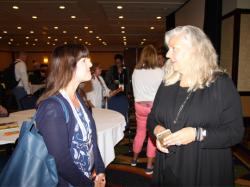PMA Foodservice Session Examines 'Food Disrupters'
August 2, 2017 | 2 min to read

MONTEREY, CA – One of the sessions at the July 28-30 Produce Marketing Association Foodservice Conference & Expo in Monterey, CA, focused on disrupters in the produce industry and how they’re helping increase consumption.
Jill Overdorf, director of business and culinary development and corporate executive chef for Coosemans L.A. Shipping, Inc., based in Vernon, CA, moderated a panel discussion called “Innovating the Plate: Why Stop There?” The session showed how restaurants across the U.S. are reducing waste and increasing produce consumption through programs involving food recovery and providing low-income families access to fruits and vegetables.
“Disruption is not a bad thing,” Overdorf says. “Disruption will change your entire business model. This panel represents everything that happens after the crops come out of the field. Shake your snow globe up a little and think about where your produce is coming from.”
Food recovery was among one of the topics that segued into a conversation about a new program designed to get produce in the hands of low-income families. After Lisa Helfman’s son didn’t want to eat birthday cake at a birthday party and instead requested blueberries, Helfman was inspired to create the non-profit organization, Brighter Bites, which distributes fresh produce to low-income families. Five years ago, Helfman started with one school. Today, Brighter Bites serves 35,000 families in more than 100 schools in Austin, TX, Dallas, TX, and Houston, TX. The organization recently expanded into Queens, NY, and is now helping families in Immokalee, FL.
“This program is getting people really excited about produce,” says Helfman, director of real estate for San Antonio-based H.E. Butt Grocery Co. “Beyond giving them produce, we have to educate them and de-mystify produce.” Many of the families have low literacy rates and are hesitant to participate in the program. The food is the equalizer that encourages them to begin engaging. “Parents are not putting produce in their carts because they’re terrified about produce,” says Helfman. “We are changing the entire school community through fresh food.” About 98% of participating parents in Houston reported their children eating more produce because of the program.
Another non-profit, Food Forward, started recovering citrus from Southern California backyard citrus trees. Every week it distributes 300,000 pounds of recovered fresh produce to social service agencies which feed more than a million people. “The gleaning of produce is not a few organizations,” says Rick Nahmias, founder and executive director. “Now, we have hundreds of organizations across the country involved. It’s a great way to really see the products you guys are spending so much time growing have a secondary life.”
Ronald DeSantis, director of culinary excellence at Yale University’s hospitality services, discussed how innovation is critical in school foodservice. “Sometimes, innovation is also as exciting as something as basic and as simple and straightforward as roasted cauliflower with seasoning,” he says. “We are in an environment where we can create those kinds of experience, in terms of food dialogue and literacy, for our students. They will be the next people going out and will be looking for things in food. We want our next generation of consumers in the market to be aware of these foods.”
Source: PerishableNews.com
